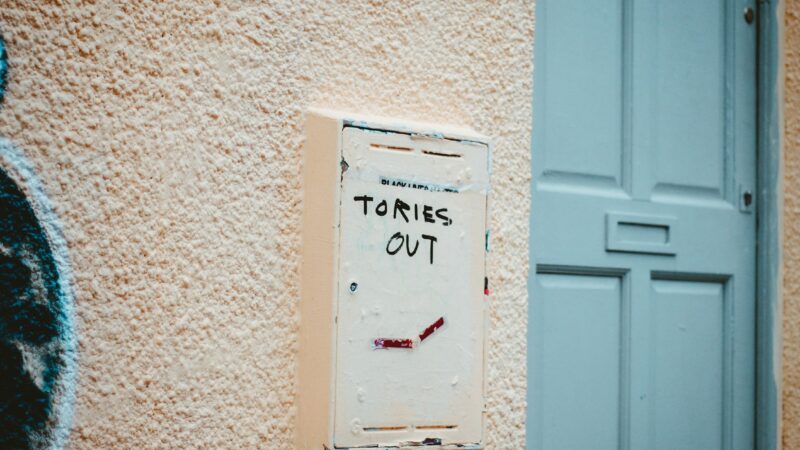The UK’s Place in the World: Strategic Industries, China, and Sovereignty
This article was originally published on 17th November 2021.
The Brexit-leading Conservative government wants to back up the talk of the referendum campaign. Now that the UK has Brexited there’s a practical need to set a plan of action and follow it. A lot of intellectual work was taken care of by just following whatever the EU position was.
Global Britain, sovereignty, trade deals, etc., OK. What’s the plan? Some of that’s answered implicitly. Elizabeth Truss as Secretary of State for International Trade was busy doing trade deals. AUKUS speaks to diplomatic, defence, and geographical focus. COP26 – the UK is supposed to make its name on climate stuff. OK.
This is what the Prime Minister says the plan is. Some key points: greater engagement in the world, securing the UK’s status as a “Science and Tech Superpower by 2030,” and a “tilt to the Indo-Pacific.” This is still getting ahead of itself.
A recent announcement about an old deal, about an investigation into the Nvidia takeover of Arm (originally a British microchip design company, taken over by the Japanese SoftBank) is a good enough starting point for something to think about.
The Cameron and May governments were very permissive of a lot of foreign investments and takeovers e.g. Chinese nuclear power projects, Huawei and 5G, invitation into the Northern Powerhouse. A lot of people are still angry at the sale of state assets under Right to Buy to British people. Why does the sale of much, much larger British companies/assets to foreign interests provoke almost nothing? What about foreign ownership in the housing market, for that matter?
At least the Johnson government has revisited some of these blunders. It also hasn’t put a complete stop to a lot else which contradicts its strategic review. For example, the Chinese takeover of British Steel, the Chinese takeover of the UK’s largest microchip producer, and the Chinese takeover of a major UK graphene producer. Sort yourselves out!
Strategic Industries and China
Start with making a proper assessment of the UK’s assets. What are you working with?
The Johnson government is promising to do a lot of things differently to the Cameron and May governments. When William the Conqueror took over as CEO, he did an inventory check, right down to the kinds of cheese in England.
Napoleon was notoriously obsessed with information.
In the autumn of 1811, the peak of Napoleon’s empire (has France been as well-governed since?) the emperor visited 40 cities in 22 days. This is despite losing three and a half days of travel to gales and floods. He would prevent mayors from giving great speeches and instead ask them questions. Population, death, revenues, forestry, tolls, municipal rates, conscription, civil and criminal lawsuits. Even about how many sentences passed by mayors were annulled by the Court of Cassation, and whether mayors had found means to provide suitable lodgings for rectors.
Would Mayor Johnson have fared well under Napoleon’s questioning? Prime Minister Johnson? Sure, why not? The information Napoleon was looking for gave him clues about the state of the empire, its operational effectiveness, happiness of its citizens, its direction, its capabilities, and what he could draw on. What are the revealing questions you could ask today?
A country’s strategic industries are certainly different from the 1800s.
The pandemic alone should’ve taught the UK that the entire west relies heavily on China for production of a lot of basic medicines. That’s concerning. It certainly relies on China for a lot of manufacturing of basic but important medical equipment too. Mark Zuckerberg’s Meta virtual/augmented reality news is also something to think about.
How comfortable is the UK with the idea of China controlling a lot of technology manufacturing, and easy access to intellectual secrets/innovations?
China is very good at controlling actual reality let alone a virtual one. The China-Taiwan tensions keep brewing. China’s been threatening Taiwan that its military won’t stand a chance if it invades. China is threatening that any outside interference will mean paying a price. Meanwhile, the world relies on Taiwan for semiconductors which go in everything. Xi promises that China and Taiwan will be reunited.
How is Hong Kong doing?
Strategic industries are no longer just about simpler things like coal and steel production for tanks and munitions. They’re also about the materials and methods of fourth and fifth generation warfare, like rare earth metals and this sort of thing.
It seems the Johnson government is at least a little but wiser to China.It’s hard to believe how cosy Cameron was prepared to get with Xi Jinping. They wanted to make Macclesfield (of all places!) the end point of the Belt and Road Initiative.
Have a look at this selfie. Cameron, soy-faced, submissively leaning in. Sergio Aguero’s having a great time, that’s fine. Xi looks like he’s holding his tongue. It’s not a meeting of peers. One has real power and the other doesn’t. This is a picture of the Emperor of China wondering how much longer he has to humour the Gap Yah guy. Is Cameron oblivious? If he is, he’s like that guy who thought he made friends with a wild Alaskan grizzly and got eaten. Does he understand what kind of animal he’s dealing with? Of course, Xi is a silly willy nilly old bear.
If Cameron wasn’t oblivious, was he just resigned to the idea of securing British comfort as a supplicant to China?
When did the west start calling Xi “President” and stop calling him “Chairman”? “Zhuxi” means “Chairman”. Xi is still “General Secretary” of the Chinese Communist Party, a title which originates with Stalin’s own role as General Secretary. That title has its own interesting history. Does “President” hide his shame? Why is the UK still sucking up to a communist by using a less embarrassing and false translation of his title?
Anyway, never mind China, what about everyone else?
Sovereignty
The UK doesn’t need to pursue absolute autarky, but it will have to think about what its strategic industries are and how much control it wants over them for how much independence.
Alignment with the US-led order has been convenient for the UK’s comfort. Countries which don’t submit to the US (e.g., Russia, Iran, North Korea, Iraq, Syria, Venezuela), find themselves poorer and squeezed. They haven’t helped themselves either. The obvious exception is China. Is it too big? Did Nixon miscalculate? The US was supposed to be a military power, China an economic one. That unspoken deal doesn’t seem to be holding. That calculation is probably changing too for everyone else as the US becomes relatively weaker and China relatively stronger.
For now, easy prosperity clearly hasn’t been everything to every country. Not everyone follows the first rule of the Satanic bible. All hail GDP, the one true measure of successful government! Sovereignty means answering to nobody else, and that’s valuable too. It has also meant that these countries develop and control a lot of their own technology. Russia and China in particular. Though it’s also a US protectorate, Israel is notable too for its self-reliance and the level of independence that affords it, regionally, at least.
Can the UK become a “Science and Tech Superpower” by 2030?
For everything it would need to achieve that, how much does it need to learn? How much of the basics does it need to relearn? Outsourced manufacturing and international, mobile academia are not a stable starting point. Knowledge fades with the people who have it, who today can move and work from anywhere.
What ties these people to the UK? What stops them from working for someone else?
The UK’s place in the world will be affected by how much it can bring under its own control.
What’s the plan?
Does anyone have any confidence that there’s any one person in the government who properly understands 1) the UK’s own state of affairs, 2) how that sits internationally, 3) what the reasonable goals are, 4) how to work toward them, and 5) has the power to make it happen?
Until the UK has that it is getting ahead of itself in any discussion about what its place in the world should be.







Zero Seats isn’t Over
Keep going. The target isn’t eliminated yet. There is more to do. There is more you must do.
You have felt mush. You must keep pushing. The target must not be allowed time to recover. It is not enough that they’re tired, meandering, and feel like they’re under a slow but inevitable gravitational pull toward irrelevancy. Where they are making mistakes, they must be helped along, not just left uninterrupted.
Waiting for the next general election for the double tap isn’t enough. You must be more ambitious and more aggressive. The work must be put in now. The fight isn’t won in the ring, it’s won long before you dance under the lights.
Certainly, the opportunity for zero seats is still open. Is it possible before the next general election?
The target’s prospects are dim. There are two things a party needs to keep going and they have neither: an offer which enough of the right people want, or an ability to inspire any confidence.
If you have one, preferably both, of these, everything else (people, enthusiasm, money, effect) comes easier.
Sundries
Let’s get two small things out of the way first. Money and supporters.
Money. They’re broke.
Donors ran while their rivals raised 15 times more in large donations. They had to cut spending on cut spending on social media advertising because they ran out of money. They’ve been in trouble for a long time, even firing cleaning and security staff ahead of the campaign to make savings. Now the target is squeezing its leadership candidates. What a convenient way of weeding out the biggest of the timewasters.
Conference this year is looking ropey. Businesses don’t see any reason to go and spend lots of money for a stall or to sponsor an event or two, apparently. Previous years have earned up to £2m profit. Pretty meagre to begin with, but better than an imminent zero. Nobody to influence. That’s long before you consider what the content of Conference will be about. Nothing motivating. This will mean less money.
Money is a real problem. They never had a lot of people dedicated to the political work, or to the grind of knocking on doors, delivering leaflets, etc. and settled for a good chunk of their supporters quietly paying membership fees and other donations, which allowed them to make up for the small number of activists compared to their competitors.
Supporters. What supporters?
One estimate puts the target’s membership numbers at 172,000 as of July 2022. Do you think it has gone up or down since then? You can assume some boost ahead of the leadership election. The results of that vote will produce a number for totals and turnout. Now is a good time to buy low, perhaps, but are the signs particularly good?
Signs from the General Election and associated polling. Certainly, the winners didn’t receive very many votes in absolute – the lowest of any winning party since the 1880s, apparently. Goodness. Well, what does that mean for everyone else? They received even fewer votes. (For a particular newer party this may not mean the same thing – perhaps it’s best judged against other new entries/debuts over the years like the Brexit Party or UKIP more recently, or even going back in further psephological history to the birth of the Labour Party, perhaps).
And of this much reduced voter support, how long will that last? In the +70-age bracket, 46%. For the 60-69 range, 33%. For 50-59, 24%, much lower than the winner’s 34%.
Assuming things stay approximately the same, with the, er, normal circle of life, one projection has the target’s vote share in total declining at a rate of 2% per year. From 2025 to 2029 that would be a reduction of 24% to 16%.
Things never stay approximately the same, though, and why take the chance?
There’s no need to be nasty. Instead, be persistently, relentlessly, merely matter of fact. The target must be made to feel like it is neither hot or cold, just straightforward inevitability that it is empty and pointless. It has no energy and looks a lot like UKIP did after Nigel Farage left it all those years ago.
What is the point of you? What are you even doing? Just give it up and try again aligned with people who might actually take you somewhere.
Leadership election
Their leadership election is certainly reminiscent of those early post-Farage death throes.
This whole thing is set to be one big example of why zero seats is not over yet.
They haven’t even technically gotten rid of the “old” disgraced leader yet. And he’s going to hang around all the way until November? Past the reopening of parliament, the budget, conference season, and whatever unforeseen opportunities and scandals and events of importance might happen in the meantime?
Losing the election and the vast reduction of their MPs was bad enough. In the winner-takes-all system the UK has they might as well have had zero seats. Now they won’t have any coordinated response to anything until November? Isn’t that going to look an awful lot more like zero seats in functionality and practice?
And who have they got? The same old ding-dongs who got them there in the first place.
Many are flexing what little they have for the pony show, it seems. The pattern from the 2019 leadership race is so far re-emerging. Never mind the “front runners”, a series of true nobodies are also taking the chance to float their names. How pointless. There are so few of you that you’ll all almost certainly get a job as a shadow this or that anyway, without having to raise your profile.
And indeed, there are very, very few of you. With only 121 MPs the biggest contenders may well only just scrape together the 10 or so nominations (including themselves) needed to proceed. This is weenie. Why is nobody treating them as weenie? Treat them as weenie. They’re weenie.
Who have they got who can take on the Prime Minister (even if he is Keir Starmer) or Nigel Farage?
They’re not just weenie, they’re totally without any creativity. These people are so empty I reckon I could write every single one of their leadership pitches without having actually seen a single one of them. I’d much rather inflict that slovenly indignity on you, duckies. Does the following sound at all familiar?
What do you reckon? That’s about right, isn’t it? Good grief.
November’s a good while away. You can expect a few relaunches of the same leadership campaign. As in, from the same politician. They’ll either fail to hit the mark or they’ll just be doing it again and again on some excuse to try to get more media attention.
And you know what? They’ll probably go through at least two leaders before the next election. And it’ll be from the same pool of MPs. People are going to get really sick of seeing the same unimpressive bunch over and over again. This is only going to be worse if, because there are so few MPs, shadow ministers are going to have to hold multiple briefs and work multiple appearances. It’ll get worse. Do you think these people have enough capacity for the mental arsenal on multiple briefs? What will this mean for their ability to cut through, to work detail, and nuance, and out-fox civil servant-resourced ministers?
All of this will perpetuate the idea that they’re disorganised and pointless. Weak.
Keep pushing on all of this. Keep pushing zero seats. It’s not over.
The target won’t reorganise
The target’s MPs don’t have it in them. There are a few reasons.
First, they’re scrabbling and struggling to keep their heads above zero seats as it is. What does this mean for reorganisation? At the best of times, MPs are looking to pick party leaders who will win them their seat, secure their seat, increate their majority, etc. First and foremost. The strongest incentive is for them personally, above anything else first, to be in office. (This is not the same as them being in power, but they think it is). It’s just that this means their own job, money, perceived prestige, pomp, etc., it’s at least somewhere in the correct 180° arc that you need to be in officer (power) to actually do anything, and that once you get some office (power) the correct thing to do politically is to keep getting more and more and more of it. The problem for the target is that they are desperate, which has its own ick, but this will also make them short-termist and wrong about what they need to do.
Second, the target has the same problem that the dying days of the Gordon Brown Labour Party had, and the first few post-2010 years. Same old people. The ideal best thing they could have done would have been to fire probably almost all of their sitting MPs and brought in a much fresher (not necessarily younger, though that might not have hurt) and energetic bunch. Even if it was naivety they’d at least sound enthusiastic and eager about whatever ideas they’d cooked up while they were dreaming of being MPs. And they wouldn’t be coming with the same dismal tainted track records. Instead, you’ve just got a bunch of blockers hanging around.
Third, the target doesn’t have anyone willing, let alone capable, of reorganising themselves. They might be making some of the right noises (see the accurate leadership pitch above) but they’ll almost certainly all be missing the point. They’ll be doing it on purpose. What’s the pitch otherwise? Here’s all these truthful reasons about why the target is awful but this time the same people will sort it out despite not understanding what was wrong before? If they understood, why didn’t they do something about it? If they didn’t understand, why humour them now? They should resign, but they won’t. Where else have they got to go? There is nothing so “ex” as an “ex-MP”. Maybe they genuinely, deludedly think that they can turn things around? Does it matter? They’re not going to go. It’s why the target is going to stay in a terrible spot.
Zero Seats is right there. Keep pushing it.
They won’t learn the right lessons
A related, but distinct-enough separate point. They won’t reorganise because they won’t learn the right lessons.
The incentives aren’t set up that way. It would mean admitting they were wrong. If they were wrong, why keep them around? Why not just start fresh with some people who were right?
They’re locked into failing to learn the lessons of the 2019 voter realignment. Reform will probably keep at it. This also incentivises them not to change. You can’t really mimic another party. At a certain point your remaining supporters leave, the ones who left will stick with the real deal, and those tempted will also just go to the real deal.
The same applies to the wets. Why not just go with the absolutely soaking in the form of the Lib Dems? Holiday-fun Ed Davey is already promising to come and kill you, at your house, in real life, and wear your dresses and makeup like the ancient Irish did, from the left.
The target is almost entirely ersatz, at best. Will that inspire at Conference?
You’ve known how empty they are for a while. It seems just as likely that they didn’t win because they were totally without plans (except for banning people from buying cigarettes or something? Who knows?) – not because they weren’t left or right enough or didn’t do anything or deliver on promises.
Beyond substance, do they even have the form for a good pitch? More on that next.
They sit out of the Pareto distribution
A lot of you were hoping for a genuine zero seats. Some of you thought sub-hundred would create the same effect.
You’re all too soft. I wanted to see one seat. Just one. Just one only lonely solely wholly put upon target MP in the whole of the country. Rishi Sunak. Could you imagine that humiliation? And then the humiliation of all the other decisions he would have had to make after that?
Anyway, a lot of you were disappointed that the target retained over one hundred seats. You suspect that this might be enough to keep them alive. Maybe, but also maybe not.
It’s still not a strong position to be in. They’re not clearly in one side of the niche of the pareto distribution or the other, are they? Genuine question.
For the uninitiated, the Pareto distribution is also known as the 80/20 rule. This is approximately that 80% of any phenomenon, market, etc. is due to 20% of the factors/actors involved. It’s never an exact 80/20 ratio, but one example might be that 80% of groceries are sold by 20% of all the grocery providers around. In other words, a small number of individual actors do most, but not all, of the business, and that remaining portion is likely done by many much smaller competitors.
In business in particular, this is important, because you either have the size and scale to do a large amount of generic mass market business, or you go smaller and niche and specialise. Think the difference between a mass market M&S suit versus Savile Row. Each has their place doing a particular sort of thing.
In the political case, does the target neatly sit in the big party or small party category? Too small to have a crack at the 80% market share, but too big to really be niche like the Green Party or Plaid Cymru or whoever?
Reform might have the opposite problem – are they genuinely going to try to break into and have a crack at being on the big boy side of that Pareto distribution? Or is it enough to function as a glorified pressure group like UKIP did (hey, not knocking it, it worked) without the full “mainstream” breakthrough?
The target is sitting very awkwardly right now.
What’s next?
Well, really, continue the Zero Seats campaign.
It’s not over. Slog it out. You didn’t think politics was going to be all excitement and meme wars, did you? Politics is a strong and slow boring of hard boards.
The way forward: take their oldies.
The target is pretty much only supported by old people now. As mentioned above, all other things remaining the same, this would see their vote share dwindling at a rate of about 2% per year. But all other things will not remain the same. There will be more oldies along in a minute. The target might start doing good politics and start making a meagre recovery.
No!
I don’t care if it’s Reform UK or the Lib Dems or the Greens or whoever or all of them. Start coming out with plausible policies, announcements, attacks, aimed at splitting off the oldies from the target.
Come on. Zero Seats!
Photo Credit.